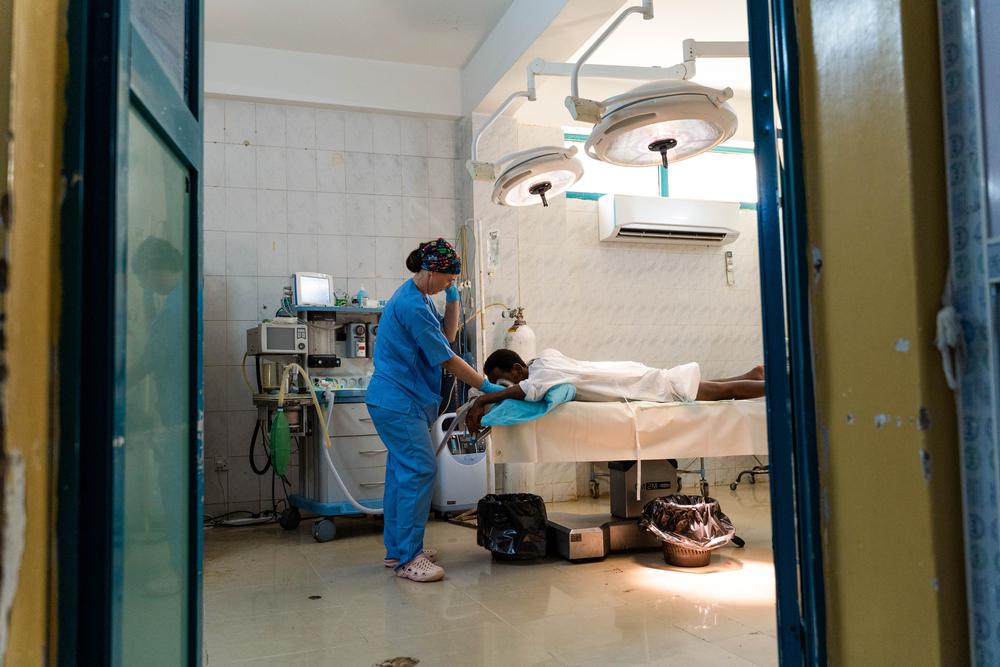The impact of the fighting on the residents of Khartoum
In the Al Kalakla neighbourhood of Khartoum, where the Turkish Hospital that MSF works in is located, there are currently at least three frontlines, so there is daily fighting between the Sudanese Armed Forces and Rapid Support Forces. This means, unfortunately, that bombing, shelling and air strikes have become part of everyday life and that, on average, we receive around 15 war wounded patients every day. Although the situation is relatively calm at the moment, on Saturday 24 June, the situation escalated dramatically when heavy fighting began around the Central Reserve Police headquarters.
Within the space of just a few hours, dozens of wounded had arrived at the hospital, and by Sunday night we had received at least 150 patients in need of urgent medical attention. Many were children and elderly people, and many came in with multiple injuries. They had abdominal trauma, fractures and many other types of wounds. Sadly, six people were already dead by the time they reached us, and three people later succumbed to their injuries. However, the work of the team was phenomenal – especially considering the fact that this hospital previously had no capacity to perform war surgery, and that many of the staff there had no previous experience of responding to mass casualty events.
The transformation of the hospital
Before the conflict began on April 15, the Turkish Hospital had only two main departments: paediatrics and maternity, as well as a small dialysis centre. However, when the conflict started and so many hospitals were forced to close their doors, it was one of the few that was able to remain open, and the Ministry of Health team who were present decided to try and meet the additional needs of the residents of Khartoum. They evacuated patients with chronic diseases from a hospital close to the frontlines and brought them to the Turkish Hospital so that they could continue receiving treatment – and they also began to use the operating theatre, which had previously been dedicated only to performing c-sections, to start carrying out surgical interventions on the war wounded as well.
In mid-May, MSF began providing support, and in the five weeks that we’ve been present, we’ve been able to help the Ministry of Health transform the Turkish Hospital from a small, specialised facility into one that is capable of responding to mass casualty events. It has by no means been easy, and there are still many improvements to be made, but given the vast number of constraints we are working under, what the team has achieved in such a short space of time has been remarkable. The situation across the city is chaotic. According to the Ministry of Health, at least 50% of health structures in Khartoum are completely closed. We are one of only five hospitals across the entire city that is fully functional, and even though we are open, there are many things that we lack.
Supplies are running out, it is dangerous for staff to come for their shifts because of the intensity of the fighting in Khartoum, and we have been trying for more than two and a half months to bring experienced emergency teams into Sudan to support the exhausted health workers here. Getting medical and surgical supplies into the country also continues to be a challenge. Visas are taking weeks to be approved, cargo is at risk of being stolen when it is on the move – and our warehouses have frequently been looted. The impediments are endless and there are shortages of many essential items, so the work of health teams who are continuing to provide medical and surgical care with so few resources should be commended.
Shortages of oxygen, water, power and food
Before the influx of wounded at the weekend, there was still only one operating theatre in the hospital. Prior to the conflict, it had been used only to perform c-sections, so we had been working to upgrade it and, although not ideal, it was enough to cope with the small number of war wounded patients we were receiving at the time. However, in response to the huge numbers who arrived at the hospital on Saturday and Sunday, within a matter of hours we managed to open a second, temporary operating theatre in order to be able to treat all the people who needed urgent surgical interventions. But we had no electricity, so we were using our back-up generator for 48 hours non-stop – and this power outage has continued all week.
We have daily power problems, and in a hospital this can have life or death consequences. It’s the same with oxygen. In the Turkish Hospital, there is a neonatal unit where there are three babies in incubators who need a constant supply of oxygen – without it, they will die. For the dialysis patients, electricity is vital for their treatment. And for surgery, we cannot operate without either of these. So we are fire fighting every day, looking for additional supplies, looking for additional oxygen cylinders, so that we can continue to try and save people’s lives. At times, it is possible to access items from the hospitals that are closed, but there are risks with doing this, due to the ongoing fighting. The reality is that every day, there is a new problem to deal with. But for the moment, we are capable of dealing with these difficulties and we are able to help all the patients who manage to reach our hospital.
A temporary calm
Although the situation is more stable today – we can still hear explosions and planes overhead, but currently there is no bombing close-by – everyone is pessimistic and convinced that this relative calm will not last long. Nevertheless, we are using this relatively quiet period to continue improving conditions in the hospital, but at the same time, preparing for a potential new massive influx of casualties.
